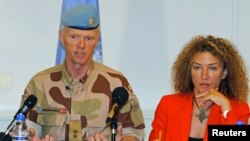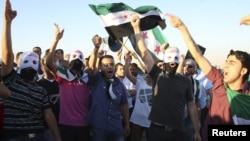The head of the United Nations monitoring mission in Syria says violence there has reached "unprecedented" levels, and that a cease-fire must be implemented in order for his unarmed observer teams to resume their mission, which was suspended last month.
Al-Qaida militants
Major General Robert Mood's comments Thursday came as Syrian troops battled anti-government rebels across the country and Iraq's foreign minister said Baghdad has "solid intelligence" that al-Qaida militants are crossing from Iraq into Syria to carry out attacks.
Speaking to reporters in Damascus, General Mood said the escalating violence has obstructed the monitors' "ability to observe, verify, report as well as assist in local dialogue." He said consolidating the mission's eight bases into regional centers would improve its effectiveness, although he did not explain how that would work.
Mood said the international community had a "moral and political" responsibility towards Syria's people.
"We cannot and we will not turn our eyes and ears away from your plight, and we'll continue our work to find new paths to political dialogue and peaceful resolution to the crisis," he said.
Mood halted the U.N. monitoring team's operations on June 16 after it was the target of numerous gunfire and bomb attacks.
Reports of government attacks
Violence in Syria continued Thursday as activists said government troops backed by helicopters advanced into the rebellious northern town of Khan Sheikhoun after shelling it with mortars and burning nearby settlements. Residents in the central city of Homs also reported heavy government attacks.
The Britain-based Syrian Observatory for Human Rights reported at least 27 people killed nationwide Thursday, a day after 99 people died in violence that has plagued the country for nearly 16 months. Activists say the carnage has spiked this week, as daily death tolls continue to rise. VOA cannot independently confirm the reports of casualties or violence because Syria has severely restricted access by international journalists.
In Baghdad, Iraqi Foreign Minister Hoshyar Zebari said al-Qaida "operational officers" were infiltrating Syria "to help, liaise and carry out terrorist attacks." Syrian President Bashar al-Assad, who belongs to the minority Alawite sect, has contended that outside terrorist agitators - including those associated with the Sunni Islamist al-Qaida network - are responsible for much of Syria's violence.
That assertion was partly corroborated Tuesday when the al-Qaida-aligned Al Nusra Front claimed responsibility for a number of attacks on pro-government targets in Syria last month, including an audacious raid on a television station that killed seven employees.
Free Syrian Army
The rebel Free Syrian Army has repudiated terrorism and rejected any cooperation with extremist groups who may be exploiting Syria's chaos for their own purposes.
On Friday, France is set to host about 100 delegations for a "Friends of Syria" meeting - one which Russia and China say they will not attend. Neither country appeared at the group's previous meetings in April and February.
Several Western nations said an accord reached last Saturday in Geneva calling for a transitional governing body in Syria precludes Assad from joining a transitional government. However, Russia and China say there is no such stipulation. Moscow and Beijing have used their veto power in the U.N. Security Council to block several rounds of proposed sanctions against Damascus.
Russian Foreign Minister Sergei Lavrov Thursday dismissed suggestions Moscow was planning to offer political asylum to Assad. He said the idea was first raised by German Chancellor Angela Merkel during talks last month with Russian President Vladimir Putin, and that "our delegation took it as a joke."
WikiLeaks
Also Thursday, the WikiLeaks website said it has begun publishing material from 2.4 million emails from Syrian political figures, government ministries and companies.
WikiLeaks spokeswoman Sarah Harrison quoted the controversial website's founder, Julian Assange, as saying the material is "embarrassing to Syria, but also embarrassing to Syria's external opponents." She said the emails dated from August 2006 to March 2012.
WikiLeaks said the emails, which it is calling The Syria Files, would shine a light on the inner workings of the Syrian government and economy, and also reveal "how the West and Western companies say one thing and do another."
Al-Qaida militants
Major General Robert Mood's comments Thursday came as Syrian troops battled anti-government rebels across the country and Iraq's foreign minister said Baghdad has "solid intelligence" that al-Qaida militants are crossing from Iraq into Syria to carry out attacks.
Speaking to reporters in Damascus, General Mood said the escalating violence has obstructed the monitors' "ability to observe, verify, report as well as assist in local dialogue." He said consolidating the mission's eight bases into regional centers would improve its effectiveness, although he did not explain how that would work.
Mood said the international community had a "moral and political" responsibility towards Syria's people.
"We cannot and we will not turn our eyes and ears away from your plight, and we'll continue our work to find new paths to political dialogue and peaceful resolution to the crisis," he said.
Mood halted the U.N. monitoring team's operations on June 16 after it was the target of numerous gunfire and bomb attacks.
Reports of government attacks
Violence in Syria continued Thursday as activists said government troops backed by helicopters advanced into the rebellious northern town of Khan Sheikhoun after shelling it with mortars and burning nearby settlements. Residents in the central city of Homs also reported heavy government attacks.
The Britain-based Syrian Observatory for Human Rights reported at least 27 people killed nationwide Thursday, a day after 99 people died in violence that has plagued the country for nearly 16 months. Activists say the carnage has spiked this week, as daily death tolls continue to rise. VOA cannot independently confirm the reports of casualties or violence because Syria has severely restricted access by international journalists.
In Baghdad, Iraqi Foreign Minister Hoshyar Zebari said al-Qaida "operational officers" were infiltrating Syria "to help, liaise and carry out terrorist attacks." Syrian President Bashar al-Assad, who belongs to the minority Alawite sect, has contended that outside terrorist agitators - including those associated with the Sunni Islamist al-Qaida network - are responsible for much of Syria's violence.
That assertion was partly corroborated Tuesday when the al-Qaida-aligned Al Nusra Front claimed responsibility for a number of attacks on pro-government targets in Syria last month, including an audacious raid on a television station that killed seven employees.
Free Syrian Army
The rebel Free Syrian Army has repudiated terrorism and rejected any cooperation with extremist groups who may be exploiting Syria's chaos for their own purposes.
On Friday, France is set to host about 100 delegations for a "Friends of Syria" meeting - one which Russia and China say they will not attend. Neither country appeared at the group's previous meetings in April and February.
Several Western nations said an accord reached last Saturday in Geneva calling for a transitional governing body in Syria precludes Assad from joining a transitional government. However, Russia and China say there is no such stipulation. Moscow and Beijing have used their veto power in the U.N. Security Council to block several rounds of proposed sanctions against Damascus.
Russian Foreign Minister Sergei Lavrov Thursday dismissed suggestions Moscow was planning to offer political asylum to Assad. He said the idea was first raised by German Chancellor Angela Merkel during talks last month with Russian President Vladimir Putin, and that "our delegation took it as a joke."
WikiLeaks
Also Thursday, the WikiLeaks website said it has begun publishing material from 2.4 million emails from Syrian political figures, government ministries and companies.
WikiLeaks spokeswoman Sarah Harrison quoted the controversial website's founder, Julian Assange, as saying the material is "embarrassing to Syria, but also embarrassing to Syria's external opponents." She said the emails dated from August 2006 to March 2012.
WikiLeaks said the emails, which it is calling The Syria Files, would shine a light on the inner workings of the Syrian government and economy, and also reveal "how the West and Western companies say one thing and do another."
Some information for this report was provided by AP, AFP and Reuters.






